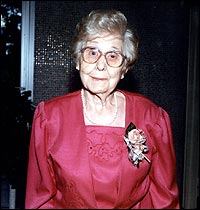|
|
Canada: Nursing Homes to face Major Changes
By Moira Welsh, the Toronto Star
May 11, 2004

Natalie Babineau, the focus of a Star series on neglected patients in nursing homes, died after a bedsore became infected with gangrene. Health Minister George Smitherman reportedly saw in her a symbol of the failures in the system.
The province is promising a "revolution" in nursing-home care in Ontario, with a major injection of new cash and tougher rules to stamp out neglect and abuse of the elderly.
Health Minister George Smitherman said yesterday the province is giving nursing homes $191 million a year in new money to hire 2,000 staff - ensuring that residents get two baths a week and have full-time access to a registered nurse.
Smitherman told the Star he will back up that new money with a "major package" of legislative reform that will create rigorous enforcement standards for nursing homes.
The sweeping changes were sparked by last December's Star investigation into nursing homes that exposed widespread neglect.
Some residents were routinely left for hours in dirty, soaking diapers; suffered from bedsores that ate down to the bone; went hungry and were ignored in their final years.
"I'm really excited about this," Smitherman said in an interview yesterday. "We've travelled a great distance in a really short period of time. These reforms are going to ensure that our loved ones are going to live out their days with the dignity we expect."
Among the 2,000 new staff will be 600 registered nurses and registered practical nurses, along with personal support workers, nurse practitioners, dietitians and activity workers, Smitherman said.
The new money will be designated in the upcoming provincial budget, along with an extra $340 million that was already targeted to expanding the number of nursing-home beds.
Smitherman also promised a series of reforms for preventing and reporting abuse that will amount to a zero-tolerance approach within the nursing-home sector, which is currently home to 70,000 Ontarians.
Many of the changes, to be announced in a news conference today, will require legislative change and will be part of the reform package Smitherman said he will introduce in the fall session.
"We are really encouraged by this," said Lois Dent, spokesperson for Concerned Friends, Ontario's chief advocacy group for nursing-home residents.
"In particular we are pleased by the mandating of family councils - it will give residents and families a voice. And the changes around accountability and enforcement are things that we've been recommending for years," Dent said.
"My concern, however, is this: (Smitherman) is depending on the public to know what is going on in the homes.
"That is only going to work if people have the choice whether they can then choose a different home."
Martina Chettle, whose mother, Natalie Babineau, 93, died from a bedsore that ate down to her tailbone while in the care of a Stoney Creek nursing home, said yesterday that change is badly needed.
"It will be a good thing, if they follow through with tougher enforcement," Chettle said.
Photographs of her mother's 15-centimetre bedsore, which developed at Central Care Corp.'s Ridgeview Long Term Care Centre, brought Smitherman to tears last December. At the time, he called Natalie "a symbol for all that was wrong" with nursing homes in Ontario.
Immediately after the series ran, he appointed his parliamentary assistant, Nipissing MPP Monique Smith, to write a report that would become a blueprint for change.
Over the next few months, she made surprise visits to 24 nursing homes and interviewed more than 100 people - residents, frontline workers, advocates and associations.
The changes that Smitherman is to announce today are taken from the report, and additional recommendations are expected to be adopted over the next few months.
Smith's report highlighted five key areas for reform as "a starting point for our revolution."
They include quality of life, public accountability, new standards for inspections and compliance, increased staffing and continuity of care, and new legislation and funding models.
Among the recommendations for new legislation, Smith highlighted the need for residents to have access to their medical records, which under the current system they are not entitled to see.
"Let's make homes feel comfortable," Smith said in an interview yesterday.
"Let's allow our seniors to live with respect and dignity. Let's move away from warehousing.
"There is so much that we can do with an attitudinal shift. And, with encouragement through more enforcement and accountability," she said.
"Those two things are really key."
|
|



